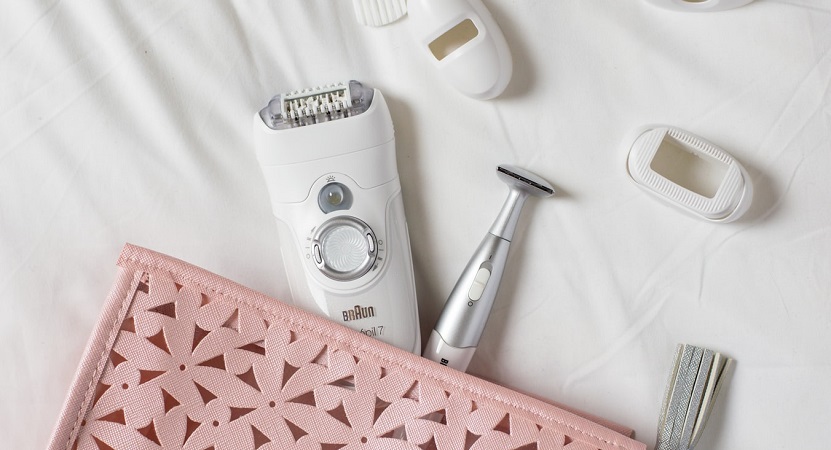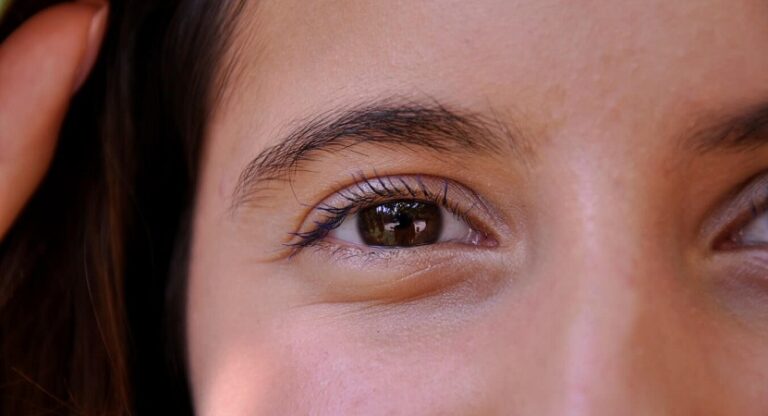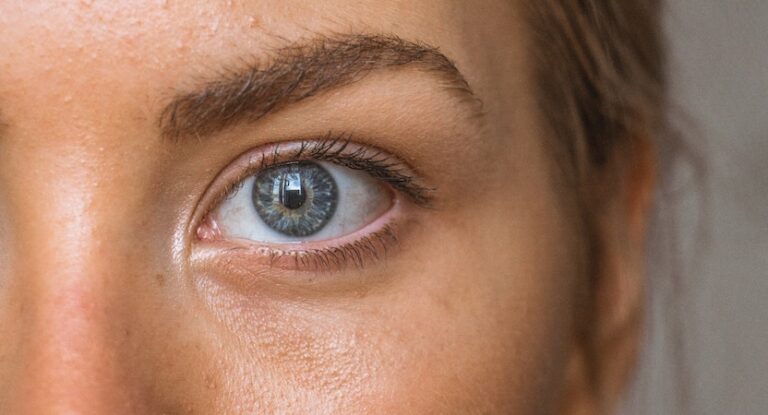Women around the world have, for far too long, been sold the notion that their naturally growing hair should be deemed undesirable and something to quickly eliminate. This has served big brands who capitalize on the idea of a clean-shaven, hair free body being the epitome of beauty. Women around the world have begun identifying this area of exploitation, and are opting for more natural hair removal techniques wherever possible; and only because being hairless is their personal preference, not because of the opinion of a big corporation.
In this article we discuss the following:
- What is Natural Hair Removal?
- Why You Should be Removing Hair Naturally
- Chemicals in Ordinary Hair Products to Avoid
- DIY: Natural Hair Removal Methods to Try at Home
- Best Natural Hair Removal Brands
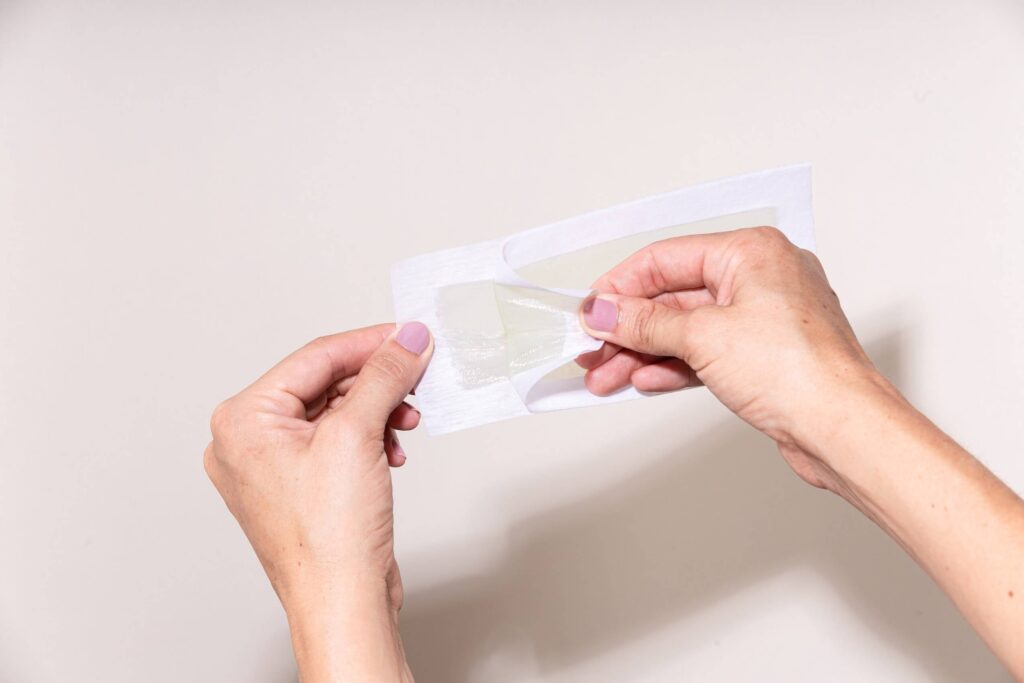
What is Natural Hair Removal?
Consider natural hair removal your newfound solution to all things hair-on-body related. The way we’ve been groomed to believe how successful hair removal needs to take place is largely uninformed and outdated, and natural techniques for removing hair are proving this by the minute.
In the past, it was largely believed that if one wanted hair removed there were only a handful of options at their disposal in order to do so. One could take the plunge and buy into one of the many adverts for razors that saturate the local television channels. One could make an appointment at their nearest beautician, either for a painful wax or laser hair removal. Or, one could take the DIY approach and administer a home-kit of chemically-formulated wax strips, or hair removal cream, on their hairy regions.
Electrolysis hair removal came later, offering people an invasive procedure whereby a qualified dermatologist inserts an epilator device into the skin in order to disrupt hair growth.
All of the aforementioned methods of removing hair are usually time consuming, costly, and also potentially painful. They also come with a plethora of risks and side effects that can cause lasting damage to the skin when administered incorrectly — and even when administered properly!
The natural way often tends to be the better way, and it turns out that natural hair removal has actually been a practice in ancient cultures for centuries. The Ancient Egyptians were known for their hairless limbs, while it is widely understood by historians that the Ancient Romans and Greeks were partial to hairless pubic areas.
Natural hair removal is the process of removing hair by the use of botanically derived ingredients. Chemical hair removal products either burn through, or attach to hair follicles using potent toxic ingredients. Natural hair removal products do the same, but in a far more gentle, healthy manner that poses less risk of toxin absorption to the individual in question.
Hair removal by natural means also ensures less harm to the skin surrounding the follicles in question. The focus is on the hair itself, instead of the entire surface area around the hair in question, with the result that it is not affected in the process.
There are a number of different ways of achieving natural hair removal; most of them require little less than just a few ingredients likely already sitting in your kitchen pantry. We’ll dive deeper into these a little later with some at home hair removal recipes that actually work — read on!
Why You Should be Removing Hair Naturally
One way the beauty industry has failed to educate adequately is by failing to inform people of just how easily chemicals are absorbed by the skin, and into the body.
The skin is a human being’s most direct point of access into the bloodstream without breaking through the surface. Natural healers around the world maintain that if a skin or beauty product contains an ingredient that you cannot safely put into your mouth, then it should also not be used on the skin.
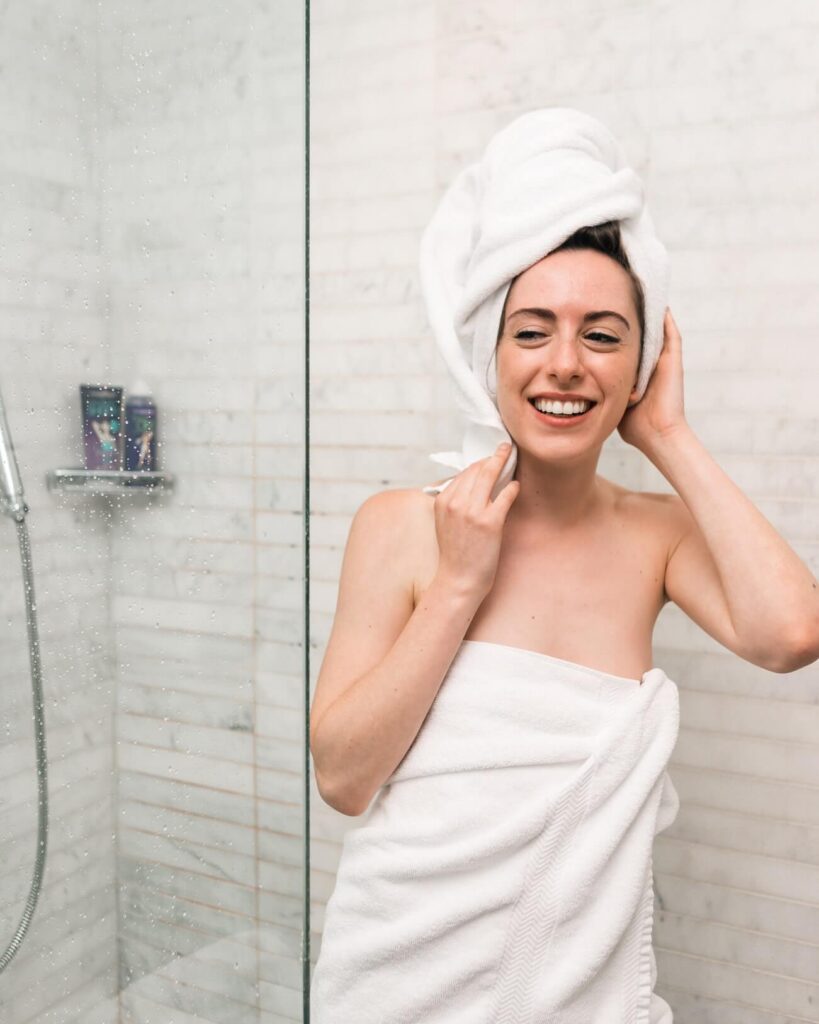
The pores of our skin have the ability to expand and contract when there are changes to the external environment. When products are applied to the skin, absorption takes place through one’s pores and the product is pulled deep into the bodily tissues, and eventually into the blood stream. Copper bracelets are a prime example of how, in the opinion of some health practitioners, something external can be absorbed through the skin for internal benefit.
It just so happens that all pores are actually just hair follicles. Some pores eject more visible hairs than others, but even the seemingly hairless parts of our bodies, such as the nose, have microscopic hairs peeping out of their pores at all times.
When we apply chemically formulated hair removal products over our pores, and pull the hairs from the follicle, it renders them wide open and at the mercy of whatever toxin is now flooding into the empty space.
The chemical compounds of products are now making their way into your system. Once they reach your bloodstream they can be carried out into various parts of the body where they can become permanent residents, causing health ailments over time.
Between our body lotions, face creams, deodorants, soaps and hair removal products, we have quite a cocktail of chemicals to potentially absorb. It makes sense then that switching to natural products wherever possible would be most beneficial to our bodies.
Let’s take a closer look at potential side effects that could come from using non-natural hair removal techniques:
Rashes and Irritation
This is one of the most common effects of ordinary hair removal products on the skin. The aggressive removal of hair from follicles understandably leaves one’s skin in a very vulnerable state. It takes a good few hours before newly waxed or shaven skin is able to form a fresh protective layer as a barrier to external forces. This is why one experiences such intense itching when swimming in the ocean shortly after a shave or wax.
Using products that are rich in chemicals can lead to independent rashes after the hair is removed. We all respond to toxins differently, and sensitive skin can be particularly reactive to ingredients with chemical compounds, whereas natural ingredients have the opposite effect, actually working to soothe the exposed, vulnerable skin while simultaneously removing hair.
Peeling
There are some skin types that are not at all compatible with ordinary hair removal products. Extremely sensitive skin can become so supple and weak when the product is applied that removal of the product can cause the epidermis layer to be removed, too.
The result leaves one with exposed, wounded skin wherever the dermis has been uncovered to the outside world. Bleeding is expected, and the healing process is similar to that of any other open wound: eventual scabbing, with possibility of scarring.
More aggressive hair removal methods are usually responsible for this kind of skin damage. Eyebrow and lip waxing is a common culprit, as the skin surrounding the hairs is extremely thin and easy to remove.
Burns and Blistering
Hot wax will always have the potential to burn the skin, though regulating this is relatively easy to do thanks to industry-standard melting machines. When it comes to ordinary hair removal, it’s more commonly the hair removal creams that do the most damage.
Hair removal creams work by eating through the hair follicles upon which they are applied. They essentially ‘dissolve’ the hairs right where the hair meets the skin, and don’t have any impact on the deeper follicle embedded within.
If a formula can burn through hair, it can burn through skin, and some users report hair removal creams having left them with subtle to severe burns.
As a general rule, if a hair removal cream feels as though it is burning you, it probably is. Too many people sit with the burning sensation occurring and do nothing about it, as they are unsure if this is simply a normal sensation for this kind of product.
Pigmentation
Pigmentation through hair removal usually happens on naturally darker skin. It is likely to occur through waxing and/or laser hair removal, as these can strip skin of melanin and leave pigmentless marks in their place.
That being said, fair skin can also see pigment problems following laser hair removal. These will show up as disturbed patches of melanin and appear much darker than the rest of the skin.
Bacterial Infections
Too often we fail to remember that beauty products also have expiry dates — just like food! Chemical hair removal products are usually filled with preservatives known as parabens, which keep the formula’s shelf life as lengthy as possible.
These products still have the ability to rot, even in spite of their high chemical composition. If an ecosystem has formed inside of a product, it is usually not visible to the naked eye. When you apply the compromised product to your skin, you’re basically inviting a bacterial invasion to take refuge on your body.
Bacterial skin infections occur when compromised products enter the body through an existing break in the skin, usually a cut, scratch, or even just a torn cuticle. If your immune system is weak enough, the bacteria will begin to cause havoc in the body.
Chemicals in Ordinary Hair Removal Products to Avoid
Upon closer inspection, a lot of the active ingredients used by the top hair removal brands are cause for concern. Some of these chemicals aren’t even found in industrial cleaning products, so the act of putting them onto, and into, our bodies is probably something that needs reevaluation.
Why is it that hair removal products have to be so potent? Keratin is the natural protein that makes human hair so tough. It is why each of our hairs are so durable, and virtually infallible to the external conditions that come with life on Earth.
Breaking down keratin is one of the most difficult jobs for any product to attempt. It takes a strong mix of chemicals to weaken keratin to the point where hairs can be removed with ease. Keep an eye out for any of the following harmful ingredients in your hair removal products:
Salts from Thioglycolic Acid
Hair removal creams are also known as depilatories. Depilatories usually contain a cocktail of salts from thioglycolic acid, such as potassium thioglycolate or calcium thioglycolate.
When combined with calcium, sodium, or potassium hydroxide, these salt acids have the ability to manipulate the pH level of the hairs and follicles, facilitating the breaking down of the cells.
Thioglycolic acid is a corrosive substance, and can cause burns and chemical injuries when in contact with human skin. What’s more, the acid is easily absorbed into the bloodstream, and can lead to internal burns in the digestive or respiratory tracts.
Sodium or Calcium Hydroxide
Sodium or calcium hydroxide is used by manufacturers of hair removal products to give the formulas their density. They facilitate the hardening of the product once it is applied to the skin, which is also why they are used in the making of cement.
These hydroxides put the skin and the eyes at risk, as they cause intense irritation to the point of swelling. If you were to encounter non-diluted calcium hydroxide directly onto your skin, you would likely need to seek the help of a medic.
Water
Don’t get us wrong, water as an ingredient in any beauty product is almost always a good sign. However, when it comes to hair removal products, water is actually a bit of a red flag.
Because they are so chemically dense, hair removal products need an effective dilutant. The chosen dilutant is used to weaken the active ingredients and make them less damaging when applied directly onto the skin.
Seeing water as a listed ingredient on any hair removal product is often confirmation that the formula contains an array of products that are naturally inclined to leave lasting damage on any surface they come into contact with.
Barium Sulfide
Barium sulfide is an alkaline earth metal found in most ordinary hair removal formulas. It is one of the oldest hair removal ingredients from the modern era, but its risks are rarely taken into consideration.
Barium sulfide can cause alkaline burns to skin if there is an excess of moisture present in the individual. This is in more severe cases, but barium sulfide also commonly causes general irritation when used on a regular basis.
Fragrances
The most off-putting feature of most hair removal products is the offensive smell of sulfur that is released when the product is active on the skin. It is something that manufacturers have worked to remedy for years, but is almost impossible to control as the sulfuric chemical reaction is so necessary to the hair stripping process.
In an attempt to at least mildly mask the stench, synthetic fragrances were added into the formulas in hopes of toning down the smell even slightly. Scent masking chemicals are almost always coal-derived, making them harmful to anyone with respiratory conditions.
If you’re wondering why not just use potent natural fragrances such as the scent of citrus, or ground cinnamon, the answer is that natural fragrances cost more to use, in turn making the hair removal product itself less profitable. This is obviously a no-go for big brand manufacturers and synthetic fragrances are seen as the superior option.
DIY: Natural Hair Removal Methods to Try at Home
You don’t need access to a thriving wellness community in order to adopt natural hair removal techniques in your home. Most natural hair removal requires little more than a few store-bought ingredients that most people already have in their kitchen.
Remember, permanent hair removal is largely impossible without a laser device. The following are short term solutions for hair that will regrow naturally over time.
Note: If certain natural ingredients have caused allergies or irritation to you in the past, avoid using them for natural hair removal. For example, if eating pineapple causes ulcers to form in your mouth, don’t follow any hair removal methods with pineapple as an ingredient — this is simply not the method for you.
Sugar Wax Hair Removal
This soft sugar wax recipe has for centuries been the natural hair removal secret for communities in Northern Africa, The Mediterranean and the Middle East. It’s a simple yet effective way of getting rid of unwanted hair.
The easy-to-make formula clings to the follicles of each hair, pulling it out at the root when eventually cleaned off. Hair removal methods that remove hair at the root are known to provide longer lasting results when compared to those that simply burn hairs at their base.
In order for sugaring hair removal to be effective, you’ll need to grow your hairs to at least 1/4 of an inch in length, so that there is sufficient hair for the formula to bind to. For those wondering how to remove pubic hair without shaving, this is it!
Ingredients:
- 1 cup granulated sugar
- 1/2 tbs of lemon juice
- 2 tbs of water
- Piece of scrap material
Method:
- Use low heat to mix the ingredients in a saucepan until they be come a firm ball.
- Allow to cool until at a suitable temperature.
- Spread the mixture in the same direction as your hair follicles, and cover with the piece of material.
- Count to 20 before ripping the material upward and away from the skin.
- Wash off any residual sugar wax using warm water.
Lemon and Honey Hair Removal
Lemon has long been the secret of how to remove facial hair naturally, and effectively. Its acidic compound weakens both the pores and the hair itself, essentially facilitating a seamless glide out of each follicle when it is washed off.
Ingredients:
- 4 tbs of raw honey
- 2 tbs of lemon juice
Method:
- Blend the two ingredients together.
- Use a cotton ball or pad to dab the mixture over the desired area.
- Let it sit for 10 – 15 minutes before rinsing with warm water.
- Repeat twice weekly and the removal results will get better and better over time.
Oats
It’s evident that oats have powerful exfoliating potential when used on the skin. Long term users of this Earth-grown substance found that oats also proved useful to remove hair from the areas of frequent use.
Ingredients:
- 1/2 tsp of coarsely ground oats
- 8 drops of lemon juice
- 1 tbs of raw honey
Method:
- Mix all of the ingredients together in a small bowl.
- Apply the mixture to the designated hair removal area and leave for 20 minutes.
- Before washing off, use a cloth to massage the mixture clockwise for a few minutes. Use warm water to rinse.
- Apply an effective moisturizer to prevent drying of the skin.
Turmeric Hair Removal

Is there anything that turmeric can’t help with? This superior product lives in even the most ill-equipped of pantries, and yet its uses are more abundant than most of the products we take time to stock our homes with.
Turmeric has been used by the women of India as a natural hair removal substance for centuries. When properly made into a paste, turmeric becomes like glue and binds itself to every hair follicle it can find.
When the glue is washed off, it takes the hairs with it, pulling it from the root. Repeated use of this method over time has shown great results in hairs eventually growing back finer and finer each time. This is our favorite method for upper lip hair removal.
Ingredients:
- 3 tsp of ground turmeric
- 1 tsp of milk (cows or nut-based)
Method:
- Combine the ingredients until a thick paste is formed.
- Apply the paste over the desired area.
- Leave for 20 minutes until dry.
- Use warm water and a wash cloth to remove the paste using a circular motion. Should the turmeric stain your skin, simply use baking soda and water to correct it.
Pumice Stone Hair Removal
Pumice stones are widely used as a natural way of removing hair. Their course texture allows them to easily cling to the hairs as the stone is rubbed across dry skin.
Ensure that your skin is clean before starting to move the stone over it. Pumice stones are easy to find and relatively inexpensive. Apply a nourishing moisturizer after using a pumice stone as they have exfoliating properties and will remove dead skin in the process.
Contrary to popular belief, pumice powder is not an effective alternative to a full pumice stone. It will not be able to pull hairs from the skin in the same way.
Best Natural Hair Removal Brands
MOOM 100% Organic Tea Tree Hair Removal Kit
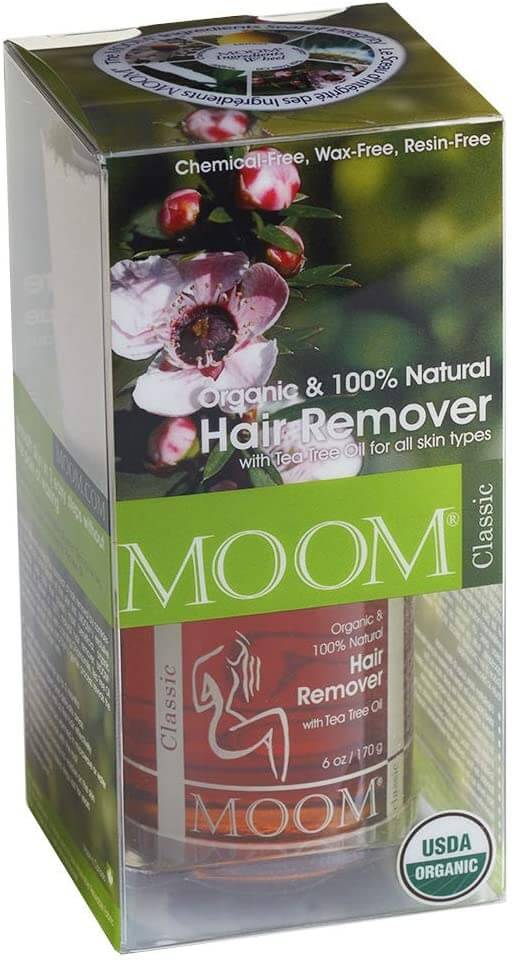
Moom is one of the top competitors in the natural hair removal game. Their range of products have been specially formulated to suit all different types of hairs, ranging from more gentle formulas for face and eyebrows to more potent formulas for bikini lines.
We consider Moom’s tea tree kit to be the best hair removal cream made entirely of natural (and organic) ingredients. The products are moderate in price and tend to last a long time.
Fitocose Sugaring Paste
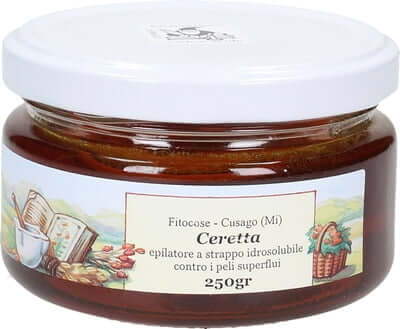
If you don’t trust yourself to make an effective sugar wax on your own, Fitocose has done it for you. Investing in this simple formula gives you a 100% vegan approach to hair removal, and comes with the necessary application spatula and pulling strips.
Hello Simple Zero Waste Shaver
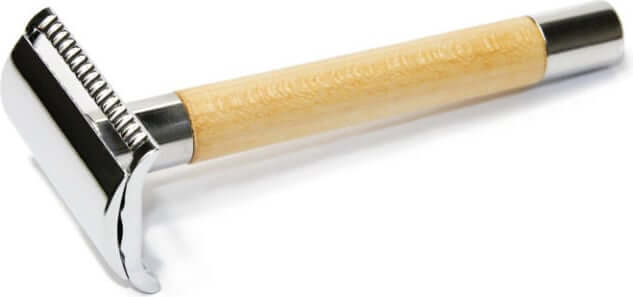
Natural hair removal involves more than just botanically derived hair removal formulas. Using single-use plastic razors every time you need to shave is not considered a natural form of removing hair.
Single-use plastic is one of the most unnatural phenomenons to plague our planet, and the natural self-care industry is making a conscious effort to combat it wherever possible.
Switching to waste-free razors is one way of reducing one’s carbon footprint for the benefit of the Earth. This device by Hello Simple features a chic design with interchangeable blades.
Capillum AMOVE Wheat AthleticX

This is an in-shower formula that gently and effectively removes hairs. It is entirely free of chemicals and made from activated wheat starch that works to separate hairs from their follicles without irritation.
The product is mild enough to use over the entire body, and is much loved by athletes for this reason. The brand also claims that regular use of the product can result in deceleration of hair growth over time.
Vegan Sugar Wax
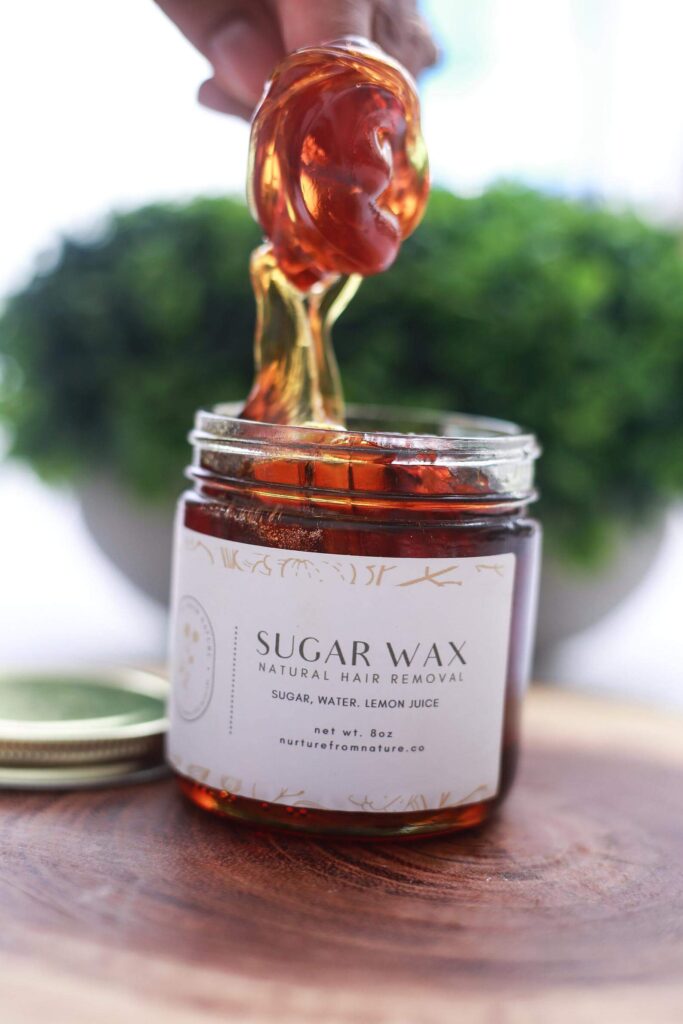
If you’d like to support a small business attempting to make waves in the natural hair removal industry, we love this one by Nurture From Nature.
It’s easy to use on yourself, and can be applied on all parts of the body. The best thing about this particular sugar wax is that one doesn’t need material in order to remove it. Once it hardens, it peels off just like dry glue.
Did You Enjoy This Article?
If you enjoyed this article, you might also like our articles discussing haircare such as Top 35 CBD Hair Products, Top 10 Ingredients to Avoid in Hair Products, Top 18 Natural Shampoo and Conditioner, and Top 11 Natural Dry Shampoo.

